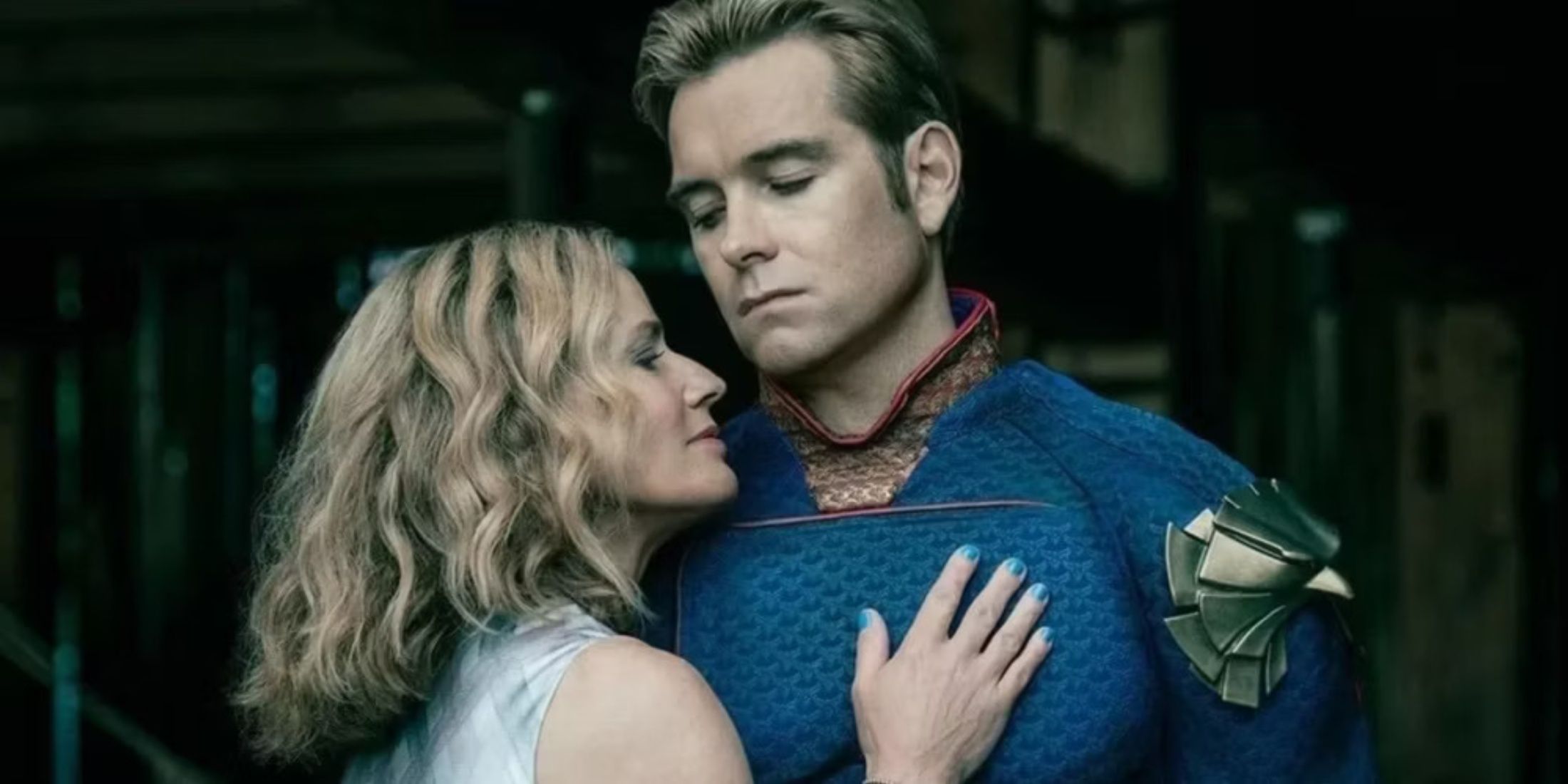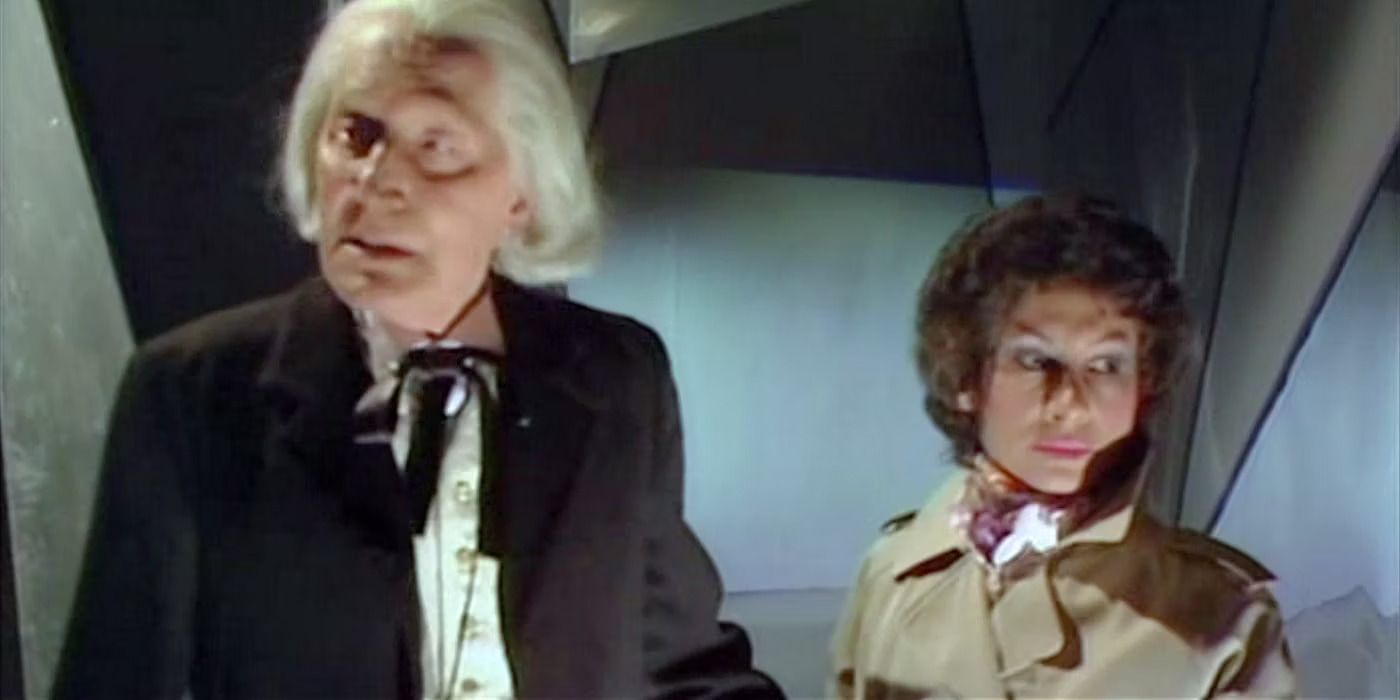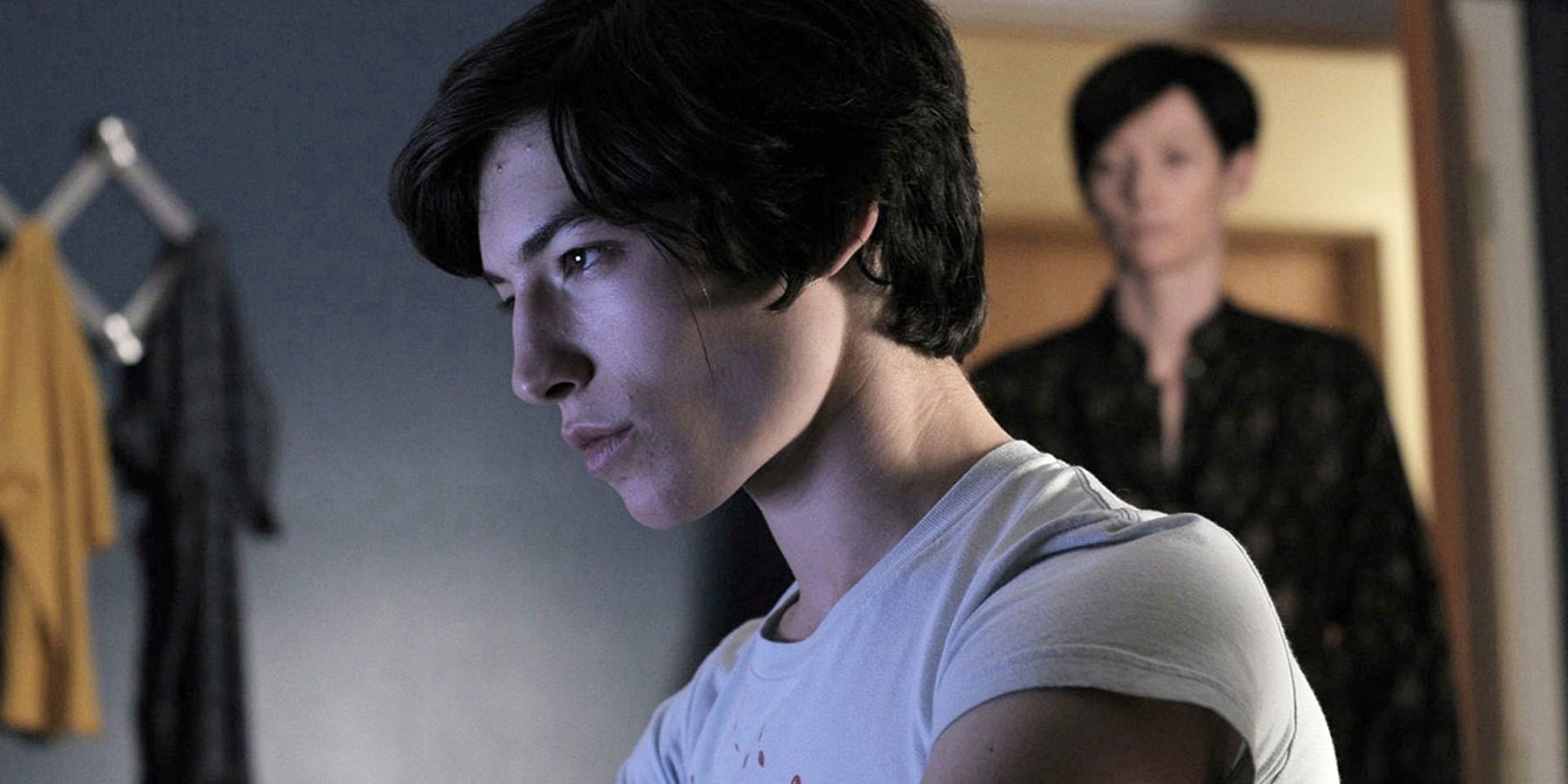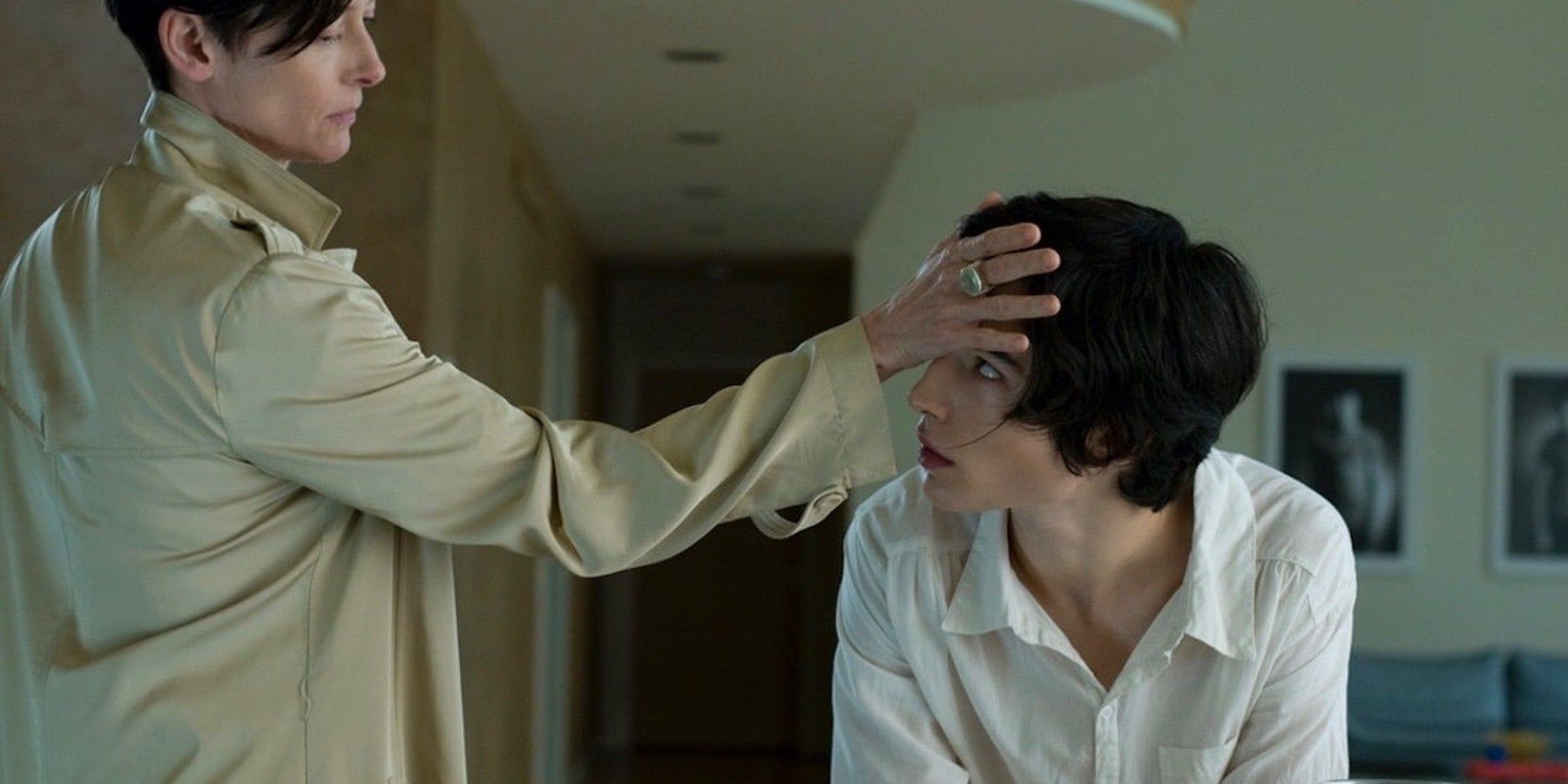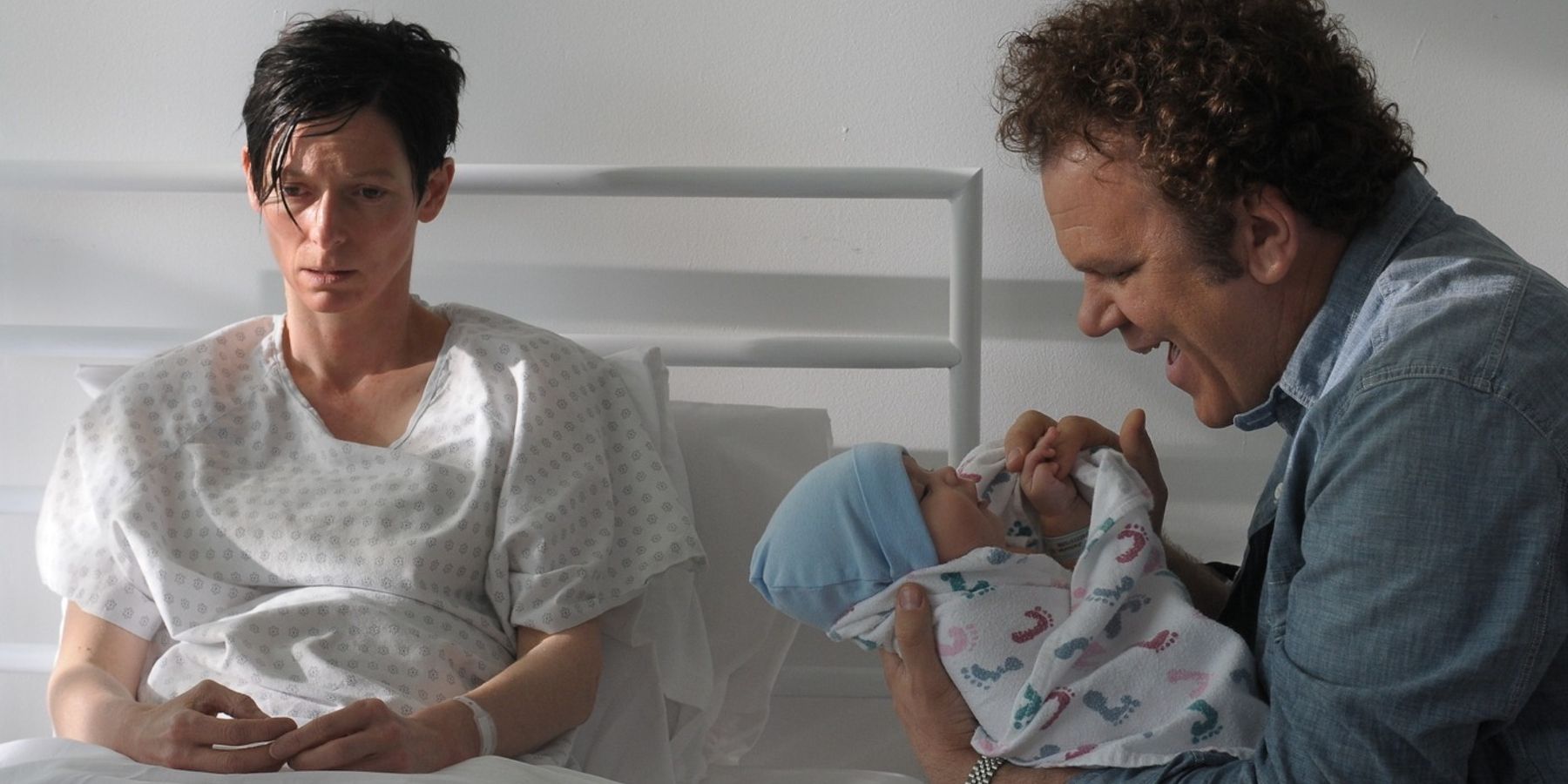"You can love your kids, but do you like them?" asks director Lynne Ramsay in a 2011 interview with IndieWire. For Eva Khatchadourian, the mother in Ramsay's critically-acclaimed movie We Need to Talk About Kevin, the answer is a resolute no. Based on the bestselling 2003 Lionel Shriver book of the same name, We Need to Talk About Kevin is a psychological thriller that explores the relationship between a down-on-her-luck mother (Tilda Swinton) and her sociopathic son, Kevin (Ezra Miller), over the course of several years: beginning when he is a fussy baby, and ending when he is a teenager, imprisoned for committing a most heinous act of violence.
The movie opens with Eva pushing her way through a swarm of bodies covered in some red substance (blood? paint?). There's screaming, but it's okay, nobody has been hurt: the massacre comes later, Eva is in Spain at the La Tomatina festival. Before Kevin was born, she travelled a lot; it was her job as a travel writer. She and her husband Franklin (John C. Reilly) lived a somewhat bohemian lifestyle, roughing it in foreign countries; but that all changed when she fell pregnant.
Eva never enjoyed pregnancy — a flashback of her pregnant and uncomfortable surrounded by smiling expectant mothers suggests as much — and motherhood doesn't come naturally to her. At best it could be said that Eva is an ambivalent mother to Kevin, at worst one could say she pushed him to darkness.
Kevin is a murderer, locked behind bars in the present day for committing a high school massacre. Eva is living alone, with her husband and daughter — whom viewers get to know through flashbacks — nowhere to be seen. Like Kevin, her life is effectively over. She might even have it worse than him, as at least he's spared from all of the horrified looks in supermarkets and small-town whisperings. Eva takes that burden on all by herself, and the movie makes it clear that to her at least, her hands are as bloody as his. A lot of the time they look it too.
A skilled cinematographer as well as director, Ramsay loves a good visual metaphor, and Eva scrubbing her hands of the red paint that somebody used to vandalize her home is one of them. It's a laborious job trying to remove the paint from the house, and viewers wonder why she doesn't just leave and put down roots somewhere else. And then it becomes clear: Eva thinks she deserves this. When a grieving mother slaps Eva in the face, she tells an intervening man it was her fault; and when two young missionaries ask her where she's spending the afterlife, she doesn't think twice before replying, "I'm going straight to hell. Eternal damnation, the whole bit."
But what do viewers think? Do they blame her, too? It certainly seems like they aren't supposed to. The movie is compassionate towards Eva; she's not a perfect mother by any stretch, but she tried, and she still does — visiting Kevin in prison, even though, as viewers learn, he killed his father and sister as well as his classmates. The big question is why he did it, and out of nature vs nurture, it appears nature is to blame here.
As a baby, Kevin can't be soothed by anyone but his father; and as a toddler, he is even more of a handful. Eva's attempts to bond with him are fruitless, and while Kevin sits for a routine exam, she expresses her concern to the doctor that his non-verbalizing is a sign of autism or perhaps something else. The doctor says he is fine, and that should be good news, but it isn't. Eva is right; something is wrong, and nobody is listening to her, least of all Franklin.
Throughout the movie, Franklin repeatedly rejects Eva's accounts of Kevin because they don't match his own limited experiences with his son. He is so outraged by what she has to say, that he proposes a divorce not long after she blames Kevin for a serious accident involving his younger sister Celia (Ashley Gerasimovich).
"You need to go talk to someone," he tells her at the hospital, which is the same one Eva and Kevin visited earlier in the movie after the latter broke his arm. Kevin tells his father he broke it falling on some toys, but Eva knows the truth: she shoved him out of anger and he landed in a funny position. But Kevin didn't lie to protect her; even at that age, he was a master manipulator and used their secret to his own advantage. All he had to do was stroke the scar and she'd obey. He loathed her — so why did he spare her?
The obvious answer is that he wanted to punish her, and allowing her to live after killing her family and effectively ending her career was the biggest punishment he could give. Another possible explanation is that deep down he did love her after all. At the end of the movie, Eva visits Kevin in prison on the anniversary of his killings. "Two years, plenty of time to think about it," she says, clearly desperate for closure. "I used to think I knew," he replies, and with such a disappointing answer, she'd be forgiven for walking right out of there. Instead, at the end of their visit, she gives him a giant hug. And to everyone's surprise, he hugs her back — to the tune of Washington Phillips' "Mother's Last Word to her Son," one of the more appropriate songs on the soundtrack, which consists of cheery Buddy Holly and The Beach Boys.
So what does it all mean? The bond between mother and son cannot be broken? Blood is thicker than...bloodshed? Who's to know? We Need to Talk About Kevin isn't a very rewarding movie; it asks a lot of questions while refusing to provide any answers. It's the kind of movie viewers won't want to watch twice, but will only need to watch once to decide not to have children. But for people who enjoy a good character study, it's pretty perfect.

